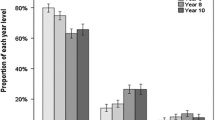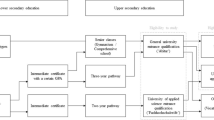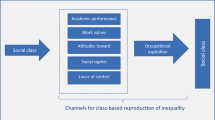Abstract
The proportion of young people opting for third level education in Cyprus is exceptionally high, currently about 60% of the relevant age group. This has caused concern among the country's policy makers who are aware of the limited capacity of the Cyprus economy to accommodate the increasing supply of higher education graduates. In the present study, an attempt is made to identify and examine the factors influencing young Cypriots to select higher education over direct employment at the end of their secondary education. A survey was conducted among 811 final form secondary school students in Cyprus in the academic year 1993/1994. Through factor analysis, seven factors with a potential effect on the students' educational and occupational intentions were identified. They were the following: Psychological/Individual, Occupational I, Occupational II, Economic, Consumption, Secondary School Subjects, and Significant Others. These factors, along with a number of student background characteristics (gender, socioeconomic status, ability, and secondary school specialisation) were used as explanatory variables in a logistic regression model with the student's educational intentions serving as the dependent variable. The psychological/individual factor, the second occupational factor, and secondary school specialisation were shown to have a significant effect on the intention to pursue third level education. The paper points to the importance of analysing and examining student characteristics and motivational patterns in the effort to understand, and, if possible, influence trends in the demand for higher education.
Similar content being viewed by others
References
Alexander, K. and Eckland, B.K. (1975). ‘Contextual effects in the high school attainment process’, American Sociological Review 40, 402-416.
Borus, M.E. and Carpenter, S.A. (1984). ‘Factors associated with college attendance of high school seniors’, Economics of Education Review 3(3), 169-176.
Demetriades, E. (1985). Cyprus: System of Education. Nicosia: Department of Statistics and Research, Nicosia Printing Office.
Demetriades, E. (1989). ‘Methods of educational planning and applications in Cyprus’, International Journal of Educational Development 9(1), 19-29.
Department of Statistics and Research (1995). Statistics of Education 1994-1995. Nicosia: Nicosia Printing Office.
Guppy, N. and Pendakur, K. (1989). ‘The effects of gender and parental education on participation within post-secondary education in the 1970s and 1980s’, The Canadian Journal of Higher Education XIX(1), 49-62.
Halsey, A.H. (1993). ‘Trends in access and equity in higher education: Britain in international perspective’, Oxford Review of Education 19(2), 129-140.
Handa, M.L. and Skolnik, M.L. (1975). ‘Unemployment, expected returns, and the demand for university education in Ontario: Some empirical results’, Higher Education 4, 27-43.
Hayden, M. and Carpenter, P. (1990). ‘From school to higher education in Australia’, Higher Education 20(2), 175-196.
Kandel, D. and Lesser, G. (1970). ‘School, family and peer influences on educational plans of adolescents in the United States and Denmark’, Sociology of Education 43, 270-287.
Kodde, D. and Ritzen, J. (1988). ‘Direct and indirect effects of parental education level on the demand for higher education’, The Journal of Human Resources XXIII(3), 356-371.
Koyzis, A. (1989). ‘Private higher education in Cyprus: In search of legitimacy’, Higher Education Policy 2(2), 13-19.
Mattila, J.P. (1982). ‘Determinants of male school enrollments: A time-series analysis’,Review of Economics and Statistics 64, 242-251.
McCreath, M.D. (1970). ‘Factors influencing choice of higher education’. Paper presented at the sixth annual conference of the Society for Research into Higher Education. London: Society for Research into Higher Education.
Meyer, J.H. (1970). ‘High school effects on college intentions’,American Journal of Sociology 76, 59-70.
Nelson, J.I. (1972). ‘High school context and college plans: The impact of social structure on aspirations’, American Sociological Review 37, 143-148.
OECD (1978a). Individual Demand for Higher Education: Analytical Report.Paris: OECD.
OECD (1978b). Individual Demand for Higher Education: General Report. Paris: OECD.
Papanastassiou, C. and Michaelides, A. (1988). Factors Influencing Young People to Enter Higher Education as Perceived by Third Level Education Graduates who are Unemployed, Underemployed, or Employed in Occupations Unrelated to their Field of Study. Nicosia: The Pedagogical Institute.
Planning Bureau (1994). Economic Outlook.Nicosia: Central Planning Commission.
Psacharopoulos, G. and Soumelis, C. (1979). ‘A quantitative analysis of the demand for higher education’, Higher Education 159-177.
Robbins Committee on Higher Education (1963). Higher Education Report of Committee on Higher Education. London: HMSO.
Sander, W. (1992). ‘The effects of ethnicity and religion on educational attainment’, Economics of Education Review 11(2), 119-135.
Savoca, E. (1990). ‘Another look at the demand for higher education: Measuring the price sensitivity of the decision to apply to college’, Economics of Education Review 9(2), 123-134.
Vakis, C. (1990). Social Influences on the Selection of Post-Lyceum Studies. Nicosia.
Williams, G. and Gordon, A. (1981). ‘Perceived earnings functions and ex ante rates of return to post compulsory education in England’, Higher Education 10(2), 199-227.
Williams, T.H. (1972). ‘Educational aspirations: Longitudinal evidence on their development in Canadian youth’, Sociology of Education 45, 107-133.
Yuchtman, E. and Samuel, Y. (1975). ‘Determinants of career plans: Institutional versus interpersonal effects’, American Sociological Review 40, 521-531.
Author information
Authors and Affiliations
Rights and permissions
About this article
Cite this article
Menon, M.E. Factors influencing the demand for higher education: The case of Cyprus. Higher Education 35, 251–266 (1998). https://doi.org/10.1023/A:1003047014179
Issue Date:
DOI: https://doi.org/10.1023/A:1003047014179




